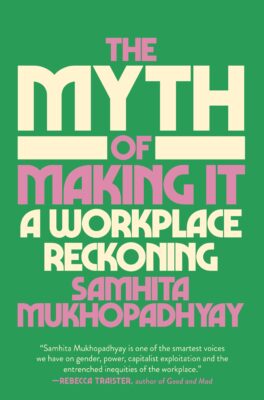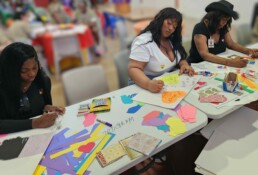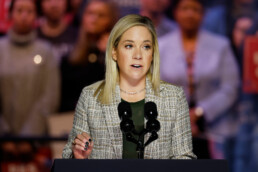What Dobbs Did Around the World
 June 24, 2024 Hi Meteor readers, Today marks two years since the US Supreme Court overturned Roe v. Wade with its anti-abortion decision in Dobbs v. Jackson Women’s Health. On this anniversary, we bring you a special newsletter—with Mariane Pearl reporting, as part of the Free Future series, on how the Dobbs ruling has affected patients and providers in countries around the world, and why the fight for abortion care is global. In solidarity, The Meteor  TWO YEARS LATERThe Reproductive Ripple EffectThousands of miles away from Washington, D.C., activists, doctors and patients feel the consequences of U.S. abortion lawBY MARIANE PEARL  A PROTESTER IN BOGOTA, COLOMBIA, HOLDS A SIGN THAT READS, "WE ARE NOT HYSTERIC, WE ARE HISTORIC." (VIA GETTY IMAGES) Two years after the Dobbs vs. Jackson Women’s Health decision, which revoked the constitutional right to abortion in the United States, shockwaves are being felt far beyond U.S. borders. Around the world, and especially in the Global South, the ruling has inspired and emboldened an already well-organized network of anti-abortion organizations who are now campaigning aggressively, calling for rights reversal in more liberal countries and even more restrictive measures in conservative ones. For reproductive-health advocates, the impact has been immediate. “The U.S. is a norm setter,” explains Giselle Carino, executive director of Fòs Feminista, an organization working for sexual and reproductive rights in 40 countries. Last winter, Fòs Feminista produced the first-ever report analyzing the global impact of Dobbs. The decision “goes against all the progress we have made in the last 50 years,” she says, creating a “chilling effect… on our partners everywhere.” And it’s not just ideas which migrate from the U.S. abroad. Anti-abortion movements worldwide are largely funded by the United States: Open Democracy estimates that U.S. right-wing Christian organizations spent at least $28 million between 2016 and 2019 attacking abortion and LGBTQIA rights globally. “The opposition’s core strategy is to mobilize young people,” says Fadekemi Akinfaderin, global advocacy lead at Fòs Feminista. “They’re in schools, they organize protests targeting abortion but also gender and women’s rights, claiming that pro-abortion funding from the West is another form of colonization, [that] it’s population control.” Carino puts it this way: “If the U.S. keeps putting money to emulate Dobbs in other countries, the consequences on women’s lives will be shattering.” Yet there are reasons to be hopeful. As in the United States, “there is a great critical mass on the frontlines—reproductive rights activists resisting the limitations of civil liberties,” says Carino. “I want to tell American women that we are ready. We have faith in our ability to stand together because our struggles are connected. And we have been resisting for so many years. Your fight is our fight. Count on us.” Below, a snapshot of what activists see as the ripple effect of Dobbs around the world. In Nigeria: A rollback of safe abortion guidelinesFive days after the Dobbs decision in June 2022, the state of Lagos developed guidelines for safe pregnancy termination—essentially a manual for health providers to deliver abortion services. But just days after that, anti-abortion campaigners used Dobbs as justification to launch a vicious media onslaught, forcing the governor to revoke the guidelines. That was a real setback in a country where abortion is already heavily stigmatized, and only allowed if the health of the mother is at risk. “We have a lot of unwanted pregnancies, we have a high maternal mortality rate and gender-based violence is at an all-time high,” says Toyin Chukwudozie, director of the Abuja-based youth development organization Education as a Vaccine. She notes that the Dobbs effect is compounded by the global gag rule, which has for years limited U.S. funding for reproductive rights organizations which provide abortion services. “The U.S. holds a lot of power in the global conversation about reproductive rights,” says Chukwudozie. “As bad as it is for women in the U.S., it’s…worse for us, because we can’t travel to another state to get an abortion.”
In Kenya: A movement to stop progress In May 2022, The High Court in Malindi had affirmed abortion as a fundamental right under the Kenyan Constitution—a ruling which drew from various international laws on abortion, including Roe v. Wade. Following the Dobbs decision, however, opposition groups successfully persuaded the Court of Appeal to halt its implementation. “The news about the Dobbs decision spread like bushfire,” says Monica Oguttu, Executive Director of Kmet, which promotes quality health and education services across Kenya. “We were in the middle of an effort to include rape and incest as a legal cause for abortion; Dobbs put a hold on that.” Health providers who receive U.S. funding are compelled by the global gag rule to deny abortion services, according to Oguttu. “It’s really difficult when you have a raped women in front of you and all you can tell her is what the law says. The women end up doing an abortion anyway and they come back to us bleeding or with a ruptured uterus,” she says. “The cost of treatment becomes much higher than if we had provided her with safe abortion options in the first place.” Yet Kenya’s pro-choice movement has also adapted, creating innovative strategies like home-based care, abortion pills, and a 24-hour hotline to deliver safe abortion services to the most vulnerable.
In Italy: Legislative barriers and religious control Dr. Elisabetta Canitano, a gynecologist and director of the reproductive health NGO Vita di Donna, doesn’t believe the Dobbs ruling changed Italy’s landscape for reproductive rights. “We had our problems before Dobbs and we have them after,” she says. “The Catholic church has almost succeeded in controlling our country and we are seeing the erosion of the lay state. It should serve as a cautionary tale for America.” Though abortion is legal in Italy, seven out of 10 gynecologists refuse to perform the procedure on moral grounds. And last April, the Senate approved a plan to allow anti-abortion groups to access clinics, where they try to deter women from abortions by forcing them, for instance, to listen to the fetus’s “heartbeat.” In response, activists are organizing through WhatsApp to connect patients who need abortions with doctors who are willing to perform them. In El Salvador: Jail time for miscarriages El Salvador—like Nicaragua, Honduras and the Dominican Republic—bans abortion completely. So the Dobbs decision didn’t necessarily worsen things—but to activists there, it looked very familiar. Helena Guerillera, the regional coordinator of the gender justice organization Mundubat, sees a parallel between the election of El Salvador’s fundamentalist president in 2019 and the political landscape that produced the Dobbs decision. “There was a general climate of disillusion and loss of faith in political parties,” she recalls. “People in the U.S. shouldn’t be fooled. It’s enough to have an ultra-right government, an active church, and emboldened pro-life organizations. The combination of the three is scary.” Today in El Salvador, at least 182 women who suffered miscarriages or obstetric emergencies are facing prison sentences of up to 40 years. Medical professionals are even required by law to call the police in cases of miscarriage. Mujeres Libres El Salvador’s Teodora del Carmen Vásquez, who was jailed after having a stillborn baby, knows these restrictive laws firsthand: “When I was about to give birth, I fainted. Then I managed to call an ambulance but when they arrived it was too late,” she says. “They took me to jail, and I was sentenced to 30 years in prison for aggravated homicide.” (She served over a decade.) Meanwhile, the Salvadoran authorities have removed reproductive rights and sex education from school curriculums. “It’s forbidden to even talk about it, which makes it dangerous for organizations like ours,” says Guerillera, who uses a pseudonym to protect her safety. Still, she is committed to the work. “Feminist and LGBTQ rights NGOs are being threatened, but we won’t back down.”
In Colombia: Riding the Green Wave With abortion permitted up to 24 weeks, Colombia has some of the most permissive laws in Latin America—thanks to 2022’s Green Wave movement, which helped decriminalize the procedure in that country, along with Argentina and Mexico. After the Dobbs ruling, anti-abortion activists began targeting privately owned clinics and leading protests—but Maria Vivas, of reproductive health organization Oriéntame, isn’t worried: “Our laws are robust,” she says. “They are inspired by a collective of 100 NGOs that came up with 95 arguments on why the right to abortion shouldn’t even be in the penal code.” Today, activists in the U.S. are seeking inspiration from Latin America (despite the “colonialist mentalities” that Vivas says often keep that from happening). “There is an effort to look at the Green Wave and understand how we did it," says Vivas. “We have great leadership down here.”  PHOTO BY JUAN LEMUS Mariane Pearl is an award-winning journalist and writer who works in English, French, and Spanish. She is the author of the books A Mighty Heart and In Search of Hope.  FOLLOW THE METEOR Thank you for reading The Meteor! Got this from a friend? Sign up for your own copy, sent Tuesdays and Thursdays.
|
![]()
Chrissy Teigen on Her Abortion
 June 20, 2024 Evening, Meteor readers, All morning, I was stressed about something trivial. But at noon, I read the following headline: A nearby black hole just woke up and devoured a whole galaxy. So that puts things in perspective! Also, RIP to galaxy SDSS1335+0728… we hardly knew ye. Back on planet Earth, we paid a visit to Washington, D.C. for a conversation between Chrissy Teigen and Vice President Kamala Harris about abortion access two years post-Dobbs. Plus, your weekend reading list. Waiting for the asteroid, Shannon Melero  WHAT'S GOING ON CHRISSY TEIGEN, VICE PRESIDENT KAMALA HARRIS, AND THEIR EXCELLENT CHEEKBONES IN CONVERSATION (SCREENSHOT VIA THE WHITE HOUSE) The Meteor’s SOL spent this afternoon at the White House listening to a conversation between Vice President Kamala Harris and Chrissy Teigen. (John Legend and all four of the pair’s children were in attendance; Wren, their youngest, had turned a year old on Juneteenth.) The event was timed to the anniversary, coming up Monday‚ of the Supreme Court’s decision to overturn Roe v. Wade. The impact of that decision, VP Harris said, “is not just that it offends some intellectual or conceptual or academic notion. The harm, the actual harm that has occurred to real people, every day since that decision came down is immeasurable.” Teigen became an advocate after seeing that harm. Today, she spoke about her own experience having an abortion due to complications from a pregnancy in 2020, and a more recent experience touring Feminist Women’s Health Center, an abortion clinic in Atlanta. (Some of its doctors were also in attendance at the White House.) Here, three of the most moving things Teigen shared:
Teigen went on to point out that there are risks to all Americans—not just those in states with abortion bans. “We’ve seen calls for a national abortion ban [and] a push to restrict access to contraception and IVF.” You can watch more of SOL’s day—and the conversation with the Vice President—on our Instagram stories. AND:
CAMERON BRINK COMING OFF THE COURT AFTER HER KNEE INJURY. (VIA GETTY IMAGES)
 WEEKEND READING 📚On preserving history: Nestled in a corner of an ever-changing Brooklyn sits Toñita's, the last Puerto Rican social club in the borough. (HellGate) On queer liberation: An intimate look behind the scenes of the world’s first Arab and anti-Orientalist drag festival. (Atmos) On getting into the 'ton: The regency romance show “Bridgerton” has created a space for characters of color in a story that could have easily been entirely white. But one Latina writer asks, “Why can’t it include us?” (Remezcla)  FOLLOW THE METEOR Thank you for reading The Meteor! Got this from a friend?
|
![]()
Voguing at Rikers Island
 June 18, 2024 Evening, Meteor readers, Tomorrow is the 159th anniversary of the first Juneteenth, the day in 1865 when the last enslaved Black people were emancipated in Texas. However you choose to spend your day tomorrow, whether it be celebrating the freedoms available or continuing the efforts towards absolute liberation, take a moment to thank Opal Lee—the 97-year-old activist who, at age 89, made it possible for Juneteenth to be recognized as a national holiday by walking from her home in Fort Worth, Texas, to Washington, DC. In today’s newsletter, Mik Bean is in conversation with trans femme artist Jordyn Jay, about hosting a vogue ball in one of America’s most notorious prisons. Plus a serious question for Olympic uniform designers. Shannon Melero  WHAT'S GOING ON
 BALL IS LIFE. (VIA GETTY IMAGES)
 HIT THE FLOORVoguing for Trans Liberation at New York's Most Brutal PrisonJordyn Jay takes us inside Rikers Island for a ballBY MIK BEAN  ITS LOOKING LIKE 10's ACROSS THE BOARD TO US. (IMAGE COURTESY OF BTFA) New York’s Rikers Island is one of the nation’s most notorious prisons, where incarcerated trans people are treated especially inhumanely. But last Thursday, it was also the site of the second annual vogue ball for trans incarcerees. “We wanted to give our incarcerated siblings more opportunities to show their dedication to the culture and the art form that is ballroom,” says Jordyn Jay, founder of Black Trans Femmes in the Arts (BTFA), which organized the ball and has funded and supported Black trans femme artists for five years now. “We are there to celebrate them and to bring them joy in this very dark, cruel system of mass incarceration.” I spoke with Jay about the Rikers ball and other radical acts of hope. Mik Bean: Shows like Pose and Legendary and Beyoncé’s RENAISSANCE tour have brought ballroom culture to a wider audience. But its history is one of radical celebration in the face of violent criminalization. Why was it important to bring ballroom back to Rikers? Jordyn Jay: So I want to be clear that the idea [for the ball] came from the folks detained and incarcerated at Rikers Island, and that is in line with the history of ballroom. Vogue began in Rikers Island from folks who were incarcerated there, referencing images that they saw in magazines. That was the only connection they had—not only to the outside world, but to their femininity, through expressing themselves by mimicking the models’ lines and shapes. Modern ballroom culture as we know it was started [in the 1970s] by Crystal LaBeija, as a Black trans woman’s dream for what society could be. She created an ecosystem in which trans beauty and bodies were celebrated. We are grateful to the people who’ve taken ballroom to a global stage, but there are also consequences when you open up a safe and sacred place to the world. A lot of the femme queens—which is how we refer to trans women in the ballroom scene—have noticed that there’s been [little] appreciation for us as individuals despite the fact that we are, historically and currently, what people come to see. So many ballroom legends and icons have passed through Rikers Island because of the criminalization of trans bodies and what trans people have to do to survive. It’s especially amazing that we’re able to bring formerly incarcerated trans women to work with currently incarcerated trans women and celebrate ballroom culture in this space during Pride—and to do so with an abolitionist lens.  FROM LEFT TO RIGHT, NEW YORK CITY MOTHER LIL KIM JUICY, JORDYN JAY, AND PHOTOGRAPHER EVE HARLOWE MAKE PRIDE POSTERS AT RIKERS. (IMAGE COURTESY OF BTFA) Can you explain what you mean by an “abolitionist lens”? It's so important that this ball is happening during Pride Month because pride and carcerality have a linked history. There would be no Pride Month without police brutality—without mass incarceration. Rikers is a global symbol of the oppression of America’s mass incarceration and policing systems. So when we bring the arts and bring pride into that space, it is in itself a protest. We are hoping that by bringing the arts into Rikers…that this revolutionary, transformative energy of the arts is able to carry [incarcerated people] forward. Can you describe the feeling of being at the Rikers ball? I'd be remiss if I didn't mention the darkness that we feel as we travel onto the island, as we navigate security, as we walk down the halls and folks are forced to stop and put their heads against the wall and their hands behind their back. It is a stomach-sinking feeling. But once we enter that room and see the faces of the folks who we came to support, there is so much empathy and so much joy. It almost feels wrong to say that our visit to Rikers was fab, but truly, that's the best way I can describe it. I think we came in with the intention of bringing joy and excitement to the women who were detained. We got just as much excitement as I hope that we gave them. The energy—the femme queen energy in particular—was just so palpable in the room. There was so much joy from the moment that we walked in.  ROCKING THE CATWALK (IMAGE COURTESY OF BTFA) Being trans is itself an act of creation. Can you share more about how you see that link in your own work? So many of the organizing bodies that center around Black trans folks are geared towards houselessness, HIV/AIDS, and fighting [anti-trans] legislation. These things are really crucial, but [they] aren't focused around joy. It's a lot of talk of loss and trauma, and that really took a toll on me in the early days of my transition. So I wanted there to be a space where we could not only come together and center joy, but also express ourselves through the arts and have the resources to do that. [Through grantmaking and production support, BTFA fosters the careers of artists like Kiyan Williams, recently celebrated for their work in the Whitney Biennial.] There are so many of us that have never had someone to sit down and touch our hand and say: “You can do this. I believe in you. I want to see your art in the world. I want to hear your voice in the world.” Trans people have to create ourselves in a world that tells us that we shouldn't exist, and that is the ultimate artistic expression. We've already broken this gender binary and this understanding of how people are able to exist in the world, so there's really an endless flow of possibility. As I was moving through my transness and meeting new trans people, every one of them was an artist in their own way. When people engage with art created by Black trans femmes, it allows them to understand us as human beings—and to see themselves in trans people. What is the future you envision for Black trans femmes artists? BTFA’s vision statement is that we envision a world where Black trans femmes can create without limitations. The headline is always “Black trans femme artists,” and I think that's wonderful for representation's sake. But my question is: At what point do we as artistic scholars challenge ourselves to view this art as art and critique it as such? When we start to engage with the actual work, there's so many more important conversations that can be had. It's just a pleasure to be able to watch this program expand. It’s in line with all that being a femme queen is: We break barriers down and we disrupt systems. Our form of protest in this space is joy, is laughter, is cheering. We hope that they all felt the power and energy behind this too-brief but very beautiful moment that we got to share.  Mik Bean is a social media strategist with a master’s degree in journalism. A former advisor and content producer for organizations including The Washington Post, Instagram, and AIDS Healthcare Foundation, Mik specializes in political science and gender theory.  FOLLOW THE METEOR Thank you for reading The Meteor! Got this from a friend?
|
![]()
Have We Been Thinking About Ambition All Wrong?
Samhita Mukhopadhyay charts a new alternative for work life (beyond the girlboss or tradwife)
BY CINDI LEIVE
Samhita Mukhopadhyay has spent her career doing two things brilliantly: being a serious boss (she helped run the newsroom at Mic and served as the executive editor for Teen Vogue), and being a serious feminist (she was a founding editor at the late-'00s site Feministing). Those dual experiences—sometimes, but not always aligned—make her the perfect person to answer the question: What does, and what should, the future look like for women in the workplace? And can you be a boss and a feminist at the same time?
Those aren’t simple questions; work, after all, is a place with its own needs, bottom line, and occasional drudgery. (There’s that old expression: If work were that pleasant, the rich would keep it for themselves.) I’ve written and talked about the subject of women and work plenty, and I still don’t have answers.
But Samhita’s new book, The Myth of Making It: A Workplace Reckoning, does. Full disclosure, Samhita is a friend and colleague: We both worked at the media company Condé Nast, although we didn’t know each other there; now, we work together at the ever-so-slightly-less-glossy outlet you’re reading right now. (We think of it as The Devil Wears Sweatpants.)
She began writing this book during the pandemic, which was—you might remember?—a stressful time for working women. We started there.
Cindi Leive: When you started to write this book, there was a lot of gleeful dancing on the grave of the girlboss. Sheryl Sandberg’s Lean In, which had been a bible of early ’10s feminism, suddenly seemed very outdated—women were realizing that if you’re underpaid, overworked, and don’t have child care, no amount of leaning in was going to fix that. But you also didn’t want to chuck the whole idea of ambition. What was the problem you were trying to solve?
Samhita Mukhopadhyay: Woman after woman in my life who were extremely ambitious in their careers were starting to question that ambition because they weren't living the life that they thought they were going to live. They weren't finding the happiness or the meaning or the purpose, and they were struggling in their personal lives.
But it felt very easy [for society] to say, “Women's ambition is dead. We should have never let you have that education and have that career. Because look what it's done to you now. You're burned out; you're tired; you're a bad mother.”
It felt like there was no space for us to be like, I'm actually in between all of these narratives. Like, I'm not going to become a tradwife, but the way we’ve been taught about ambition—pull yourself up by your bootstraps, work as hard as possible, girlboss your way to the top—that narrative is also not working for me. I'm going to do something more impactful. And I wanted to explore that.
You just referred to the kind of other side of the spectrum from the girlboss—the tradwife. Can you define that term?
There has been a trend of [female] influencers declaring that they are no longer going to pursue career ambitions and they're more focused on their family and their husbands. It's a trend that's hard to actually quantify—it gets a lot of press coverage because anything that's critical of women's ambition gets a lot of press coverage. All the women in my life have to work! But I think we are fascinated with the idea of putting women back in their place.
That's where this question of limited narratives comes in, because wanting a soft life or embracing more balance in your life should not come at the cost of women's progress. A happy life with dignity should not come at the cost of you being able to pay your bills, right? We should be able to do all of that.
But work has become so inhumane, and we conflate a rejection of capitalist hustle culture with rejecting the progress of feminism. The problem isn't that women are ambitious and they want to work. The problem is that we have a society and workplaces that can't support [those ambitions]. Especially for mothers.

One of my favorite lines in the book is when you say that girlboss culture sold the idea that capitalism and feminism could have a totally functional baby. Do you see those things as totally at odds? Is there no place in feminism for trailblazers like Ursula Burns [the former CEO of Xerox] or Indra Nooyi [of Pepsi]—or even what you were doing at Teen Vogue?
I think the connection is not as…fluid as we had hoped. [laughs] Ursula Burns and Indra Nooyi, while they are groundbreaking, they are exceptions, right? They're often peddled to us as “You could do this, too!” And the reality is, most of us actually can't do that. It's impossible for one person to fix [the system]. It's collective action that's going to bring change. It's not necessarily that having women in these roles isn't valuable. I just don't think it's been as successful as it’s been sold to us.
You say that you don't have all the answers—you write that “this is not a how-to book.” But I’m going to push you for a little advice anyway. What’s the best way to be a better—and maybe more feminist—boss? You’re really good at it.
One of the things that I always think about is: What does it look like to have my ambition be connected to the ambitions of the people that work for me? So that I am a unit with them, and that no matter how I move forward in the workplace, my moving forward is connected to their moving forward. The research is showing that women are actually better at doing that, too: They're better at creating inclusive work environments where people feel seen. So what does it look like to shift the focus and say I will do everything I can to support my employees? Within reason, I mean; at the end of the day, we all have to get our jobs done. In some environments, profit’s gonna matter, productivity is going to matter. But I do think that as managers we can say to our employees, I will always advocate for the biggest raise for you. I will always advocate for you to get the training that you want. And for you to be able to take care of your family and to take care of yourself.
You also say that bosses need to be better about admitting mistakes. You tell a really vivid story in the book about being called the wrong name in a past role…
I was sitting in a high-level meeting and the person leading the meeting called me by the wrong name—the name of another South Asian executive at the company. It was a complicated moment: Technically, I wasn't supposed to be in that meeting; I was there in lieu of my boss. The other executive was supposed to be in the meeting, and she was not there, so it was the perfect storm for a mix-up. In the moment I was like, that couldn't possibly have just happened. But the person next to me was like, “No, that happened.”
The way you write about it, it sounds as if it was upsetting to be called the wrong name. But equally upsetting was the way it was handled, where nobody actually admitted to having done what they had done.
I did feel upset that it had happened. I already felt so uncomfortable in that room around all of these senior people. And that kind of confirmed for me that I really shouldn't be there. But—let people make mistakes, right? I use the wrong pronouns sometimes; things like that happen. I don’t think that it means that the person [making the mistake] is vicious or angry or inherently racist.
But everybody made a big deal about it, and I noticed that the focus was much more on this mistake rather than all of the forces that create a mistake like that: lack of representation for women of color in leadership roles, or lack of effective diversity and inclusion programs that actually address unconscious bias. There’s research on this: They call it the same-race effect or same-race bias; when you have not been exposed to a variety of people in another race, you tend to confuse them for each other. There's also a power dynamic here: People in management positions tend to do it more often than employees, because employees have to be very aware of the identity of the people that are managing them. And most managers are predominantly white, so you can see how that plays out. It was the conflation of all of those things in that moment. But we focus so much on the question of, “Oh, is that person racist or not racist?” And then that becomes the question, rather than how we create a situation where people of color can work with dignity.
So if someone does make a mistake like that, what is a better way of trying to deal with it?
First and foremost, by acknowledging the mistake and saying, “I am so sorry. I'm so embarrassed. Of course I know who you are. My mistake.” If you realize in the moment, do it in the moment. I’ve had to do that: “I’m sorry, I know that's not your gender pronoun, let me do that again.” It's a little awkward, but it goes a long way toward making the person feel seen and heard. And if you don't realize in the moment, admit that it happened and that you are committing to do better next time. I don't think people realize how far those apologies actually go! I really felt like I did something wrong, like, Oh my God, how dare I be here, and be Indian! So an apology helps.
There is this huge opportunity right now for leaders to really take seriously the question of how to make everybody feel included or confident or empowered at work. If you’re truly invested in diversity and inclusion, you can get to know every single person that works for you. And treat everyone with the recognition of: We know who you are, and we know what brings you here.

You’re talking about the importance of a feeling of belonging at work. And one of the most moving stories in the book is when you get a bad performance review and you go out to sob on a bench outside. You're in your 30s and you feel ashamed of being so upset, and you later realize that it’s because the review taps into this preexisting feeling that maybe you never belonged in that workplace to begin with. Is belonging a fundamental thing for us to think about as we redefine ambition?
Absolutely. The statistics around how lonely people feel at work are quite devastating, right? It's especially true for women and people of color, who often feel very alienated in the workplace. When we're taught that we don't belong somewhere, it's very hard to do your best work or to even show up. In my own case, my own struggles in early schooling—and bad grades—really impacted what I thought was possible for myself. And so I always felt like I was faking it, like I actually didn’t deserve [success]. I think that a lot of people struggle with that at work. And I think that working from home has caused more alienation, especially for young women, because so much of what I learned at work was being mentored by older women. And that piece is really missing right now: the feeling that someone’s invested in your career and working to help you feel included. That’s one reason people are quiet-quitting; they're not feeling like they're part of something bigger.
I want to ask you how all this ties into social change. A fascinating study just came out showing that those “lean In” messages can actually lower women's motivation to protest gender inequalities at work. Did that surprise you?
It did! I could see that individual-style “workplace feminism” has not been effective, but we still need it. I mean, I'm not going to stop telling young women that they should ask for more money!…But what I found so interesting is the finding that when you internalize the idea that your success is dependent on your behavior alone, that disconnects you from a broader story about gender justice. That research is a missing link: We have isolated women with this attitude of “to have it all, you have to do it all.” And then that internalization has blinded us to the way structural realities are impacting us.
The alternative to what we’ve been doing is that we actually come together and rise up—rise up together.
That Abortion Pill Ruling
Hi Meteor readers,
This is my confession: the other night, I stayed up until 3:30 a.m. to witness NYC workers use two giant cranes to erect a $32 million, Italian-steel pedestrian bridge outside my apartment. Infrastructure, it’s amazing! It’s expensive! I really wish someone would fund my local library!

Anyway! Today we’ve got Rebecca Carroll in conversation with author Glynnis MacNicol on her new book. Plus: The Supreme Court rules unanimously that mifepristone access is safe—at least until the next villain comes along with a better argument.
Julianne Escobedo Shepherd

WHAT'S GOING ON
Mifepristone prevails! For now!: The Supreme Court, in a unanimous decision, dismissed a suit challenging access to mifepristone for medication abortion. Sixty-three percent of abortions are administered by medication, a number that increased after SCOTUS overturned Roe v. Wade. The ruling means that, for now, mifepristone is still accessible by mail everywhere (including in states where abortion is banned; it just carries legal risk there).
The suit, brought by the right-wing Alliance for Hippocratic Medicine and represented by attorney Erin Morrow Hawley—Sen. Josh “Jan. 6" Hawley's spouse—tried to argue that mifepristone shouldn't be accessible by mail, and that the FDA shouldn’t have ruled the drug safe for abortion because it put patients at risk, an assertion that is patently untrue. During oral arguments, SCOTUS expressed skepticism as to whether the plaintiffs had legal standing, and as expected, today’s opinions, written by Justices Kavanaugh and Thomas, speak to this. Which is to say, it’s a rare win, but one with an asterisk: Kavanaugh basically provided a roadmap for future suits, writing that because the plaintiffs “do not prescribe or use mifepristone, plaintiffs are unregulated parties who seek to challenge FDA's regulation of others." That’s basically an anti-abortion bat signal—he’s essentially asking for a suit from plaintiffs who do prescribe or use mifepristone.
But! There are a few cases in mifepristone’s favor currently weaving through the legal system: in Bryant v. Stein, a University of North Carolina doctor is suing that state for its restrictions on mifepristone, and GenBioPro Inc., v. Sorsaia is a similar suit in West Virginia. And in Washington et al v. FDA, the Attorneys General of 17 states plus the District of Columbia argue that the FDA has too many restrictions on mifepristone, challenging the rules that say the drug can only be provided by certified doctors and pharmacies. Controversial opinion: I agree and make it free.
AND:
- The Southern Baptist Convention is currently on its own little rampage to restrict everyone else’s bodies. While its vote Wednesday to ban women pastors from its churches failed, the convention voted to oppose IVF under the logic that frozen embryos are people—and also issued a guidance for Baptists to pressure the government to ban it, too. Even more disturbing was SBC seminary president Albert Mohler Jr.’s vile justification that IVF is the “alienation of reproduction in the conjugal setting,” and that LGBTQ people “exploit” IVF—which is to say, Al Mohler, a freak weirdo who also believes the earth is only 6000 years old and that doing yoga is anti-Christian, wants to keep queer people from being able to have children. In related news, young women are leaving the church in record numbers. Wonder if these things are connected, or?
- The U.S. Senate, for its part, is voting today on The Right to IVF Act, a Democrat-sponsored bill which would guarantee access to fertility treatments. It won’t pass, but—as with last week’s birth control debate— now we’ll know where our public servants stand.
- Hundreds of law enforcement officers have been caught sexually exploiting and abusing children whom they met on the job, according to a devastating, yearlong investigation by the Washington Post. Yet many of the perpetrators identified by the Post have gone scot free, with almost 40 percent avoiding prison time—and over half of those who were sentenced to prison receiving five years or less. A reminder here that police were never defunded—in fact, across America, police were funded even more.
- Rep. Ayanna Pressley said what we’re all thinking about Justice Alito.
- Bridgerton’s Penelope Featherington (played by Nicola Coughlan, our Irish queen) went full nude and gently lost her virginity, in what fans say is the best sex scene of the series. Shonda Rhimes does it again!
- In celebration of Father’s Day this weekend, we revisit a conversation from Free Future 2023 with beauty influencer Cyrus Veyssi who, together with their dad, is showing queer youth the possibility of a loving and accepting future.
https://vimeo.com/870324938/184fbfa78f?share=copy

OUR PLEASURE DOES NOT BELONG TO THE PATRIARCHY
BY REBECCA CARROLL
Author Glynnis MacNicol rejects the idea that feeling good is a frivolous pursuit

I recently decided that I’ve aged out of doing anything that doesn’t bring me some kind of pleasure, so Glynnis MacNicol’s new memoir, I’m Mostly Here to Enjoy Myself: A Woman’s Pursuit of Pleasure in Paris, might as well have been written for me, and me alone. MacNicol is single, and has written (and defended herself) extensively about this fact throughout her career (it was the subject of her first memoir, No One Tells You This). But even if you’re not single, there is something so immediately relatable, and deeply satisfying, about a woman choosing to feel good on her own terms. MacNicol, who is now 49, does that and then some with I’m Mostly Here to Enjoy Myself, which reads like an exquisitely unsupervised joyride through a sex-filled summer, with gooey cheese and good girlfriends set against the backdrop of a Parisian sky.
Rebecca Carroll: If you Google the word pleasure, which I did, the framework is invariably related to eroticism, sex, indulgence, and guilt. Beyond the patriarchy, why do you think that continues to be the narrow framework for pleasure?
Glynnis MacNicol: What I was trying to capture in this book is that the sources of pleasure for me at this age are so varied. My friendships bring me enormous pleasure. Sometimes, I think my bike is the love of my life—the movement and agency, and the idea I can get myself somewhere is pleasure. The idea of supporting myself as a writer brings me enormous pleasure. I don’t know how you can separate [any of] it from the patriarchy, though. Sarah Schulman wrote a piece in The New Republic after Roe was overturned, where she said that men have been determining the representation of women in story and structure for so long that women have internalized it to the point where we don’t understand our story outside of it—we don’t have any language around [our own representation] as being worthy of access. Even understanding that the sex in this book, and there is plenty of sex in this book, is what will likely end up selling it [to a broader audience], is connected to the patriarchy. Because when men think about women’s pleasure, they think, “Oh, she’s naked and having sex.”
I have to ask, because we are in this era of Ozempic—there’s this strange, oxymoronic thing about it, which is that here is a medication that will shut down your desire to eat, so that you can arrive at a place where your body is worthy of pleasure. What are your thoughts?
Wild, right? But whose pleasure is it now worthy of? Not your own. This book was written before the Ozempic era, and so there was none of that framework in terms of this medication that is [maybe] about restricting pleasure. I do feel like the way [Ozempic] is being used is reflective of how well-trained we are to think of our bodies as a source of pleasure for other people, and not for ourselves. But I recognize that there are very real health concerns at play. And I have not moved around the world in a fat body—I don’t experience the bias that comes with that. And I recognize the power of the pleasure you could experience by having a world that, even if you disagree with its value system, finds you valuable if you’ve only ever been punished by it.
What do you feel like you learned about pleasure through writing this book that you didn't know before?
That it’s serious. That it’s not a frivolous pursuit. If we want to talk about rethinking power structures, pleasure is as valuable a place to start as anywhere. The degree to which capitalism is based on [women] feeling like there’s something wrong with [us] that needs fixing is enormous. And in this moment, where women are losing access to abortion care, the move to rescind no-fault divorce laws portends to a future where women have less ability to control their own finances and ability to move freely, what begins to consume us is shrinking our bodies. And so a woman enjoying her own body feels very dangerous. There’s a fearlessness and a sense of power that comes in the ability to take pleasure in yourself.

Rebecca Carroll is a writer, cultural critic, and podcast creator/host. Her writing has been published widely, and she is the author of several books, including her recent memoir, Surviving the White Gaze. Rebecca is Editor at Large for The Meteor.

WEEKEND READING 📚
- On obsession: Do you know or have kids who cannot even talk yet, but are obsessed with the psychedelic babyscape that is CocoMelon? Jia Tolentino went down the neon rabbit hole. (The New Yorker)
- On sanctuary: Aude Konan wrote about the hope for Côte d’Ivoire as a safe haven for LGBTQIA+ people in West Africa. (Africa is a Country)
- On creativity: If you, too, are obsessed with the work of Julio Torres, don’t miss Cat Cardenas’s profile (or Torres's kaleidoscopic new TV show, Fantasmas). (De Los)

"There Is No Triage"
 June 11, 2024 Evening, Meteor readers, Today could be the last time you hear from me. Somewhat kidding! But I am signing off for the rest of the week to go camping and put that whole “bear versus man” thing to the test in the wilds of New Jersey. Turns out my midlife crisis hobby is just Outdoors.  In today’s newsletter, we look at Gaza’s decimated healthcare system. Plus, Justice Alito says the quiet part out loud—into a tape recorder. 🐻🐻🐻, Shannon Melero  WHAT'S GOING ONGaza hospitals in crisis: Over the weekend, when the IDF massacred 274 Palestinians in Nuseirat refugee camp while extracting four Israeli hostages, the situation at Al-Aqsa Martyrs Hospital—one of the last remaining hospitals still operating in Gaza—became exponentially worse with “hundreds” of patients and doctors pushed to the brink due to a lack of supplies and fuel to run generators. “Even the gloves we need for operations are missing,” Ali Abu Qorma, a surgeon, told The Daily Beast. (Multiple ceasefire deals that would have released the hostages peacefully have been rejected, most recently by Israel on May 7, but the U.S. is hoping the country will accept a proposal just passed by the UN Security Council, which Hamas has already verbally accepted.) The conditions at Al-Aqsa particularly concern public health experts, since 84 percent of all medical facilities in Gaza have been damaged or leveled by Israel's ongoing bombardment. Images coming out of the hospital are similar to those across Gaza: burned and bleeding patients, mostly children, lying on the floor in over-capacity medical wards where hundreds of refugees were already taking shelter. In a voice note sent to Doctors Without Borders, Karin Huster, a medical coordinator working in the hospital, said, “It's just one of those moments when you don't think about the chaos that is happening. There is no system, there is no triage. You roll up your sleeves, you put a ton of stuff in your pockets, and you do the best you can…But there is nothing, nothing at all, that justifies what I saw today. Nothing.” And as is almost always the case in conflict zones, the conditions across Gaza are even worse for women and girls, according to Dr. Natalia Kanem, executive director of the UN Population Fund. “We are facing a situation where women are delivering babies by cesarean section without anesthesia because there’s no energy, there’s no generator, the medicines are running out,” she told Al-Jazeera. Meanwhile, the UN's World Food Program has paused its aid shipments in Central Gaza after the IDF “rocketed” two of its warehouses in Nuseirat. Cindy McCain, executive director of WFP, told The Washington Post that the IDF’s actions “have made things a lot more dangerous.” (The Palestinian Red Crescent has also said that soldiers entered Nuseirat while hiding inside humanitarian aid trucks, which the IDF denies.) In March, an IPC report estimated that 1.1 million Gazans were struggling with catastrophic hunger; by July, the entire population could be experiencing full-blown famine. To help, you can donate to the Palestinian Red Crescent Society here and Doctors Without Borders here. The Palestine Children’s Relief Fund focuses on humanitarian aid to children in particular, and you can donate here. AND:
 NAME A MORE ICONIC JODIE. I'LL WAIT. (PHOTO BY NOEMÍ GONZALEZ)
 SOME OF THE "CONTESTANTS" OF THE FIRST EVER MISS AI BEAUTY PAGEANT. I'M SENSING A THEME HERE. (SCREENSHOT VIA WORLD AI CREATOR AWARDS)  FOLLOW THE METEOR Thank you for reading The Meteor! Got this from a friend?
|
![]()
SCOTUS Girl Summer
It’s going to be a big month of Supreme decisions. Here’s what to expect.
BY JULIANNE ESCOBEDO SHEPHERD
As Earth barrels into what looks to be another record-setting hot summer, certain U.S. Supreme Court Justices will be presumably enjoying the July-October recess at their beach houses, on luxury yachts, in a pile of dollar bills, and the like. But before the court breaks in about a month, it will be handing down decisions on abortion access, gun laws, social media, and more. So what we're saying is, bust out the fans, sunscreen, and comfortable marching shoes, because it might be another scorching SCOTUS girl summer in these streets.
Let’s take a look at a few of the most important rulings that will come down from SCOTUS—and one that already has.
THE RACIAL GERRYMANDERING CASE
Remember this when Republicans post MLK Jr. quotes on social media.
Here’s a decision we don’t have to guess about: The court has already handed down one discriminatory, landscape-altering decision in the form of Alexander v. South Carolina NAACP, or the racial gerrymandering case, in which SCOTUS approved a South Carolina voting map that shut out a large portion of the Black population from its district—basically stripping away Black South Carolinians' voting power. (For a great history of gerrymandering, a wonky word that obscures how much real damage it does to everything from abortion rights to racial justice—The Meteor's SOL has a terrific explainer for you.)
The decision makes it much easier for any state to redraw voting maps based on racial lines. Not only do these maps benefit white voters above everyone else (and Republicans, since Black voters are more likely to vote Democrat), they are part of a larger effort by extremists to undo voting rights gains made during the Civil Rights Movement. That effort includes big, sweeping devastations, like the gutting of the Voting Rights Act in 2013, and smaller, state-level tremors, such as the Kansas Supreme Court's anti-American ruling last week that voting isn't a fundamental right. This SCOTUS ruling didn’t get the press attention it deserved, but it’s a big, big deal.

THE TWO ABORTION CASES
As if Dobbs wasn't enough!
Coming down shortly from SCOTUS: decisions in two cases that have to do with how—and whether—Americans should be allowed to access the basic medical procedure that is abortion. The first, FDA v. Alliance for Hippocratic Medicine, was brought by a group of anti-abortion doctors who charge that mifepristone, a progesterone blocker used in medication abortion, shouldn't be accessible by mail. (Here I must stop to observe the irony of a group of people who want to prevent patients from receiving care calling their practice “Hippocratic.” Also, Hippocrates doled out abortion recipes! But I digress.) The FDA approved mifepristone for abortion purposes in the year 2000 after rigorous testing; the Alliance is using junk science to falsely assert, decades later, that the drug puts patients at risk. Were SCOTUS to side with the Alliance, it would hamper abortion care for millions of women across the U.S.—medication is the most common method of abortion—not to mention kneecap the FDA's ability to approve any drug in the future. Fortunately, this case is expected to go in the favor of the FDA; during oral arguments, a majority of the justices seemed to think the Alliance didn't have the grounds.
In Idaho v. U.S., the potato state wants to be allowed to imprison doctors and other medical professionals who perform abortions, including in life-threatening cases, unless the pregnant person is literally on their deathbed. That extremist position is in violation of the Emergency Medical Treatment and Labor Act (EMTALA), which requires Medicare-funded hospitals to administer treatment to anyone who requires emergency care. (Forgot what EMTALA is, exactly? We’ve got another explainer.) The U.S. sued Idaho shortly before its law took effect, and now here we are, begging nine unelected officials to let people live their lives. (Or, as the ACLU put it, “Supreme Court to decide whether politicians can deny emergency care to pregnant people.”) The conservative justices were hard to read during oral arguments, but The Nation's Elie Mystal thinks it's not looking good for U.S. (and us).
THE DOMESTIC ABUSERS WITH GUNS CASE
Seems like they shouldn’t have them? But I’m just one lady with a brain.
In 2019, a 23-year-old Texas man named Zackey Rahimi was seen dragging the mother of his child across a parking lot, banging her head on the dash as he threw her into his car. When he realized there was a witness, Rahimi fired a gun at that person—resulting in a civil protective order that barred him from owning a gun and a restraining order to protect his former partner. Then after he was arrested for violating the restraining order, using a gun to threaten yet another woman, and shooting a gun five separate times in unrelated incidents, the state banned him from having guns under a statute that says, logically, that domestic abuse suspects should not have guns.
But after SCOTUS overturned a New York gun law that required a license to carry a concealed weapon, Rahimi sued and claimed that the domestic abuse law preventing him from having a gun is unconstitutional. (*silent scream*) And now gun stans are hoping that the court will loosen the country's extremely loose gun requirements even further. “If we’re just going to go back to the time in which the Second Amendment was written, that’s terrifying," Krista del Gallo, legislative director for the Texas Council on Family Violence, told the Texas Tribune. "It’s also—I’ll use this term—offensive. It’s offensive to women and children, who were the property of their husbands at the time; it’s offensive to Black people, [who] were not fully citizens at the time. There’s just so much there.”
THE UNHOUSED-PEOPLE CAMPING CASE
Is public land too public?
Another case coming down the pike goes after some of the most vulnerable among us: Grants Pass v. Johnson is a case in which the small city of Grants Pass, Oregon, wants to continue to arrest and fine unhoused people for sleeping outside. (Maybe this country should invest in housing for all?) The Ninth Circuit affirmed that doing so constituted “cruel and unusual punishment” in violation of the Eighth Amendment's imprisonment regulations, but the city continues to argue otherwise. Now we're about to see yet another test of this court's capacity for compassion with a ruling that will affect the unhoused in every state in America.

OH—DID YOU THINK WE FORGOT ABOUT JANUARY 6?
In addition to the aforementioned nail-biters, there are also a few cases that go to the heart of what our democracy even is—and what it might become. They raise questions like:
- Can a former president be prosecuted for, say, trying to overturn the results of a democratic election? Or can he be charged for obstructing the certification of those results? We’ll discover those answers in the cases of Trump v. United States and Fischer v. U.S.
- Can a presidential administration ask social media companies to stop spreading misinformation about, say, unprecedented health crises? You'd think this is a gimme, but the Republican Attorneys General who filed Murthy v. Missouri say no!
- SCOTUS will also need to answer the existential question of whether or not the federal government should do, like, anything? Some people (Relentless, Inc. v. Dept. of Commerce, Loper Bright Enterprises v. Raimondo) are wondering.
If all of this happens to rile you up, there are steps you can take that don't involve magically animorphing into President Biden and pushing Congress to expand the courts. (But wouldn't it be nice?)
- Demand Justice, which recently projected an upside-down flag on the Supreme Court building in a sly protest of Alito's (wife's) (allegedly) own upside-down flag, has a number of ways to get involved with their movement, including donating and joining their rapid response team.
- If you happen to be an attorney or law student—or even if you don't—you can join the Peoples' Parity Project, which has many chapters at colleges and in cities across the country. (You can also donate or pick up some pretty cool merch.)
- Fix the Court could use your donation, too, for their big ideas and a roster of several, small but mighty ways SCOTUS could become, in Peoples' Parity Project's words, "unfucked."
See you out there. 🌞

Julianne Escobedo Shepherd is a writer, culture critic, and editor in NYC. Her first book, Vaquera, about growing up in Wyoming and the myth of the American West, is forthcoming for Penguin.
Can the GOP Identify an IUD?
 June 6, 2024 Evening, Meteor readers, We’re approaching the most important event of the New York City social scene this weekend. I am obviously talking about the Puerto Rican Day parade. *horns blast in the background* *Marc Anthony begins to sing softly* For anyone wondering why a parade like this still matters, I remind you that it was once illegal to display the Puerto Rican flag in Puerto Rico, and to this day, the island exists under a smothering blanket of colonialism.  In today’s newsletter, Rebecca Carroll speaks with author Prentis Hemphill four years after the uprisings of summer 2020. Also: the new attacks on birth control, and your weekend reading list. Shannon Melero  WHAT'S GOING ONControlling birth control: Perhaps you were wondering why there was a 20-foot inflatable IUD in Washington, D.C. yesterday? It wasn’t feminist performance art (at least, not in the explicit sense); the IUD was erected by Americans for Contraception, a nonpartisan advocacy group, to bring attention to the Right to Contraception Act, which Democrats took to the Senate floor yesterday—and which Republicans blocked from consideration. (Sen. Chuck Schumer was the sole Democrat to vote no, but purely for procedure, so he can re-introduce the bill.) This was all part of the plan: Dems knew that Republicans would filibuster a bill that guarantees access to contraception and introduced it to make a point in an election year. (The House passed it in 2022.) As Sen. Maizie Hirono, one of the bill’s sponsors, put it after the vote: “Once again, Republicans have shown they’re more interested in controlling women’s bodies than protecting our freedoms.” Republicans have also shown that they love to lie, with Sen. Rick Scott and 21 of his extremist colleagues stating that the bill would force churches and elementary schools to hand out condoms. That's absurd (it unequivocally doesn't), but so is claiming that IUDs are a form of abortion—which is what Christina Francis, a Republican-affiliated, anti-abortion gynecologist, told Sen. Patty Murray on Wednesday in a hearing about the bans. (Asked point-blank whether she believes IUDs and the morning-after pill Plan B are abortifacients, Dr. Francis responded that she does. In truth, both work to prevent pregnancy.) This is all part of the right-wing agenda to demonize contraception overall, including the evangelical right's ongoing disinformation campaign against The Pill. Meanwhile, Republican senators continue to insist that they really, truly, pinky-swear don’t want to touch the right to contraception: Josh "Jan. 6" Hawley scoffed at the bill, telling NBC, “Nobody's going to overturn Griswold. No way”—a reference to the Supreme Court decision protecting contraceptive use. (He also went on to claim, erroneously, that the bill’s passage would make the abortion pill mifepristone “available in all 50 states no matter what the law is.”) But given the court’s current makeup, enshrining protections for the rights we most take for granted is crucial: “We are kidding ourselves,” Sen. Schumer said on the floor, “if we think the hard-right is satisfied with simply overturning Roe.” A vote on the IVF bill is next. AND:
 WE LIKE THIS NEWSLETTER, TOOFrom our friends at Capital B: “There’s more going on in Black communities than what usually makes the news. Capital B is your guide to fresh perspectives and a deeper understanding of the big issues impacting the culture from coast to coast. In our weekly national newsletter, delivered every Saturday, our reporters share insights into a major story, and help you stay up to date on the news you won’t find in Big Media. Sign up for the newsletter today!”  ABOUT THAT “RECKONING”“What We Do in the Streets Is a Way of Grieving”BY REBECCA CARROLL On the fourth anniversary of the Black Lives Matter uprisings, author Prentis Hemphill offers a new way of looking at things, and what's next VIA PRENTISHEMPHILL.COM Four years after George Floyd’s murder, I realized that I simply do not have it in me to write another piece about Black pain, patterns and cycles of violent racism, and the endless trauma that continues to course through our bodies and bloodlines. I’ve literally written hundreds of them. I’m tired. And it feels like nothing ever changes. But years ago, I asked the late civil rights activist Julian Bond how he managed to stay hopeful in the face of what often feels like little progress. He said, “There are enough victories to keep hope alive, and that’s what activism is.” And so I keep looking for the victories, which lately has meant having conversations with folks, particularly younger folks, who are deep in the work with fresh eyes, bright minds, and open hearts. Prentis Hemphill is one of those folks, one who, right on time, has a new book out called What it Takes to Heal: How Transforming Ourselves Can Change the World. The author, therapist, and organizer spoke with me about the power of collective grief, finding the small openings of possibility, and the necessity of visual longing. Rebecca Carroll: Your book begins, “When Trayvon Martin was killed, I had just started working at a community mental health clinic in Los Angeles, one of three Black therapists on a staff of nearly fifty.” How do you hold the grace to write about the fact of yet another Black body being killed? Prentis Hemphill: The only way is by being in community that can feel, and grieve, and strategize, and celebrate. That’s the only thing that actually sustains me. I can only face things because I’m held, and because I’m also holding. Every time someone in our community is killed in this way, it reverberates. We have memories of people in our communities that were killed that way, people in our families that were killed that way. The ongoing violence against Black people, it reverberates through all of our grief and all of our pain. Even though we as a people have made it this far because we reach for each other, I think we also try to—and have to—shoulder more than is ours to bear. I was just having a conversation with a dear friend and organizer, Malkia Devich-Cyril, about how our grief has been criminalized and that part of what we do in the streets is a way of grieving. But because of what is projected onto us as Black people, our actions are never read as grief rituals; they are often labeled as violent, disruptive, inconvenient. By “what we do in the streets,” I take that to mean being collectively loud, actively creating movement culture, and just being Black—does it matter whether we know that we are simultaneously grieving?  BLACK LIVES MATTER PROTESTORS TAKING TO THE STREETS OF NEW YORK CITY, JUNE 2020. (VIA GETTY IMAGES) That’s a great question. Having been at a lot of protests and on the ground in so many different places over the last 15 years, I think a lot of people know that their grief is present. But there’s the connective piece—the collectivizing of the experience of “I feel this pain”—that we don’t talk about. We know it’s our grief, but we also narrow it, because that’s what we’ve had to do to get by. I am interested in starting to unlock how [our grief] can be bigger, because that’s the truth of what we’re holding.
 WEEKEND READING 📚On strange bedfellows: Would it surprise you to learn that Planned Parenthood’s cybersecurity is managed by Raytheon? Just like all relationships, it’s complicated. (Prism) On talking to the dead: AI is creeping its ways into all facets of everyday life. But a new AI company, Eternos, wants to make it part of death, too. (Fast Company) On bad takes: The good news? Everyone is talking about women’s basketball. The bad news? Everyone is talking about women’s basketball. (The Atlantic)  FOLLOW THE METEOR Thank you for reading The Meteor! Got this from a friend?
|
![]()
"Let's Light Some Fires"
 June 5, 2024 Hey hey hello, It's your girl, reporting to you from the wilds of perimenopause, which is supposedly cool now. That's easy to say when you're not on the receiving end of a hot flash (who installed this faulty radiator in my body?!), but I am very happy that at least these days, there is more reporting about the subject—including this op-ed published last week by Sadhvi Siddhali Shree and Alyssa Milano—as well as the beginning of government action. When I started looking into it a few years ago, all I found was, and this is a technical term, nada.  More importantly, in today's newsletter Cindi Leive speaks with Amanda Zurawski, the lead plaintiff in the suit against Texas's inhumane abortion policy, about her next steps now that the Texas Supreme Court has decided to uphold the ban. Spoiler: it was a devastating blow, but Zurawski has exciting plans to fight back. Plus, Simone Biles makes history (again), and OpenAI employees confirm that AI is kinda as bad as you think. Let's do this, Julianne Escobedo Shepherd  WHAT'S GOING ON
 THE GOOD FIGHT“They Don't Look at Us As Human Beings”BY CINDI LEIVE Lead plaintiff Amanda Zurawski on the Texas Supreme Court’s decision to uphold a ban that almost killed her—and why she’s planning to run for office herself "LET'S LIGHT SOME FIRES," SAYS AMANDA ZURAWSKI (VIA GETTY IMAGES) We’ve grown accustomed to courts acting coldly, but last Friday’s Texas Supreme Court decision seemed especially and brutally devoid of compassion. In Zurawski v. State of Texas, the court had heard from 20 women who had been denied abortion care when experiencing pregnancy complications—women who had hemorrhaged, been forced to carry babies without skulls, and nearly died. And yet, the justices still ruled not to change or amend Texas’s abortion ban, which has forced doctors to deny patients vital medical care out of fear of prosecution. (What this says about the state’s regard for the vastly greater number of people who need abortions for less “medically necessary” reasons—such as, you know, not wanting to be pregnant anymore—is a story for another time.) Over the weekend, I called Amanda Zurawski, the woman who lent her name—and the last year and a half of her life—to the lawsuit. I first met Amanda in the fall of 2022 when a doctor whispered to one of my Meteor colleagues that there was a woman in Austin who’d been through hell and might be willing to share her story. She did, detailing her harrowing experience for the world, but then went on to do much more, testifying before Congress, speaking up for other patients—and taking on her own state’s government. Cindi Leive: This decision felt like a punch in the face to so many women—but for those of you who testified, and your families, it was so personal. What measure of justice were you and [your husband] Josh expecting? How much was this a surprise to you? Amanda Zurawski: It wasn't a huge surprise because we know that the Texas Supreme Court is full of conservative Republicans—[all] nine of [the justices] are conservative Republicans. And then, after the ruling in the Kate Cox case [in which the court denied the December 2023 abortion request of a Texas woman whose fetus had no chance of survival], that was a signal of how our case was going to go. So we had time to prepare for a loss. What we weren't expecting, and what we were really surprised by, was the way that they wrote the decision—that they literally wrote out most of the plaintiffs by not even using their name. [Only three patients and two doctors were referred to by name in the ruling.] And that felt unnecessarily cruel and offensive…To me, it means they don't care about us and they don't look at us as human beings. They don't care about our trauma, our grief, our loss. They don't want to acknowledge us. Because as long as they can ignore us and pretend like we don't exist—just like my Senators [Ted Cruz and John Cornyn] did when I testified in front of Congress—they can pretend like the problem isn't real. We did a press call right after the ruling came out, and there were 11 plaintiffs that could join. And seeing their faces and hearing their voices and how heartbroken they were—that was really gutting.  AMANDA ZURAWSKI (CENTER IN WHITE) LAST MARCH WITH SOME OF HER FELLOW PLAINTIFFS AND LAWYERS FOR THE CASE (VIA GETTY IMAGES) You said that that was the hardest part for you. Why? I want to acknowledge my name was used in the Supreme Court’s decision. They did acknowledge what happened to me personally, and they didn’t for anyone else. And that feels very unfair and very unjust. And I also feel a little bit like…people were counting on me, I think, because I was the first one to file, because it was my name on the suit…I do feel a little bit like people were depending on me, and I feel a little bit like I let them down. You said on Friday, “We will continue to fight.” Tell me how. Well, I don’t think our lawsuit can do much more. People keep asking me if it’s going to go to the U.S. Supreme Court, and I want to make it very clear that…likely, this is the end. But we can keep fighting in other ways. Personally, I will continue to campaign to get people to vote for pro-choice candidates. We can continue to share our own stories and to share other people’s stories. We can donate our time and our money to abortion providers and organizations. And did you say that some of the Texas Supreme Court justices are up for reelection? Yes! There are three up for reelection [Jimmy Blacklock, John Devine, and Jane Bland]. I think we know now very clearly how they feel about…a woman’s right to choose, so I’m really hoping that we can get the word out before November and not get them reelected. It feels really good to be able to say that so clearly, because for a year and a half I couldn’t, because we had an ongoing lawsuit. [Now] I’m like, let’s light some fires. I’ve been thinking about what’s happened in Texas since you first filed your lawsuit. You were the first [plaintiff], and then there were five women, and then 20. And I don't know if you saw this thread, but just two weeks ago, Ryan Hamilton, a musician and DJ, tweeted that his wife, who had been pregnant with their second child, was denied abortion care in a very similar situation to yours. Despite the baby no longer having a heartbeat, she was repeatedly sent home. She lost so much blood that he found her unconscious on the bathroom floor. She almost died. This happened in Texas two weeks ago. How does it feel knowing that while the Supreme Court is making this decision, claiming that doctors are able to do the right thing [under existing Texas law], the number of women who have been exactly where you were continues to climb?  RYAN HAMILTON SHARING HIS WIFE'S HEARTBREAKING STORY. (SCREENSHOT VIA CBS NEWS) That story makes me sick to my stomach. And it's going to keep happening, because lawmakers aren't doing anything to fix it. It's infuriating that the Supreme Court of Texas had the opportunity to fix this—had the opportunity to make things better—and they did nothing. And when the Supreme Court says, “Doctors can practice medicine, this isn't a problem, the law is clear”—clearly that's not the case! Listen to our stories. Listen to what's happening to us. Listen to doctors. They refuse to hear us, and I don't know what it's going to take for them to wake up and realize that people are dying because of this. Or if they haven't yet, they're going to. There's an enormous amount of suffering happening in Texas and similar states, and they need to fix it. Three months ago, when the Alabama Supreme Court was deeming embryos people, you said that you worried that Texas was going to do the same, and that you were going to move your embryos out of state. The irony is incredible: You need IVF because the state's laws impacted your fertility, and now the state is making that path to having a family more difficult. How has that process felt? It was pretty upsetting, because moving embryos is, as you can imagine, incredibly complicated. It is very expensive. And from my understanding, things don't go wrong very often, but if they do, it's catastrophic—you lose your embryos. As we [were] going through it, I'm like, this is terrifying, because I feel like we're on a ticking clock, because Texas [could] make this decision [to criminalize IVF] any day. By the way, there now is a case about embryonic personhood that the Texas Supreme Court is deciding whether or not to hear…[and] depending on how they rule, it could do the exact same thing that happened in Alabama and threaten IVF access. Fortunately, our [embryos] are now safe, but if Trump is reelected, we're scared that it won't matter where your embryos are, because he'll institute national bans or laws that are going to affect their safety. It's just a really troubling, scary time right now to be trying to plan a family. Last question—what gives you hope right now? Is there anything? You know, in our press call, my fellow plaintiff, Dr. Austin Dennard, said that she likes to think that people are good. And I agree with her. I think that most people at their core want to do the right thing. And when we're speaking out about what happened to us, we do see a lot of goodness in most people. And I see the people who are fighting in their communities. I see people who are running for office because they're trying to protect women. And I think there's a lot to be hopeful about. I do think we're going to fix this. It's going to take a lot of work, but we can do it. You mentioned women running for office. I can't get off the phone without asking you the same question that America Ferrera asked you onstage at our event a year and a half ago. Any further thoughts about you running for office? Oh, yeah… That is probably going to happen. I've started trying to figure out what office might be a good fit for me. I’ve talked to a lot of different organizations; I’ve talked to a lot of different individuals. I think the next step would be fundraising. But Zurawski ‘26 is probably something you’ll see. Zurawski 2026. Amazing. We’ll leave it there. The plaintiffs in the case are: Patients Amanda Zurawski, Lauren Miller, Lauren Hall, Anna Zargarian, Ashley Brandt, Kylie Beaton, Jessica Bernardo, Samantha Casiano, Austin Dennard, D.O., Taylor Edwards, Kiersten Hogan, Lauren Van Vleet, Elizabeth Weller, Kristen Anaya, Kaitlyn Kash, D. Aylen, Kimberly Manzano, Danielle Mathisen, M.D., Cristina Nuñez, and Amy Coronado; and health care providers Damla Karsan, M.D. and Judy Levison, M.D., M.P.H. Read their stories on the Center for Reproductive Rights site.  Cindi Leive is the co-founder of The Meteor, the former editor-in-chief of Glamour and Self, and the author or producer of best-selling books including Together We Rise.
 THE METEOR IRLPhoenix friends! We'll be out in front of the Arizona State House on Saturday with all kinds of fantastic people like Deja Foxx, singer Lauren Jauregui, Busy Philipps, and more—advocating for bodily autonomy (in the state that resuscitated an 1864 law, no less). Come say hello!  FOLLOW THE METEOR Thank you for reading The Meteor! Got this from a friend?
|
![]()
Our First Felon President
|
And Mexico's first woman leader
 June 3, 2024 Hello and wow, Where were you when a New York jury found Donald Trump guilty of 34 felony counts of falsifying business records in the so-called Stormy Daniels hush-money case? I was relaxing on my couch, thinking about the Disaster Girl meme. Sentencing will occur July 11—four days before the Republican National Convention. Each count carries a penalty of up to four years in prison, though the presiding judge, Justice Juan M. Merchan, may instead choose to sentence Trump to probation, fines, or house arrest. In any case, Trump’s inevitable appeal is unlikely to be wrapped up before the 2024 election, but he’ll always be known as the U.S. president who became a convicted felon over using campaign funds to suppress a National Enquirer story to influence the 2016 election. We got the reality-show president we wanted, I guess! While we let all this sink in, today’s newsletter focuses on another consequential election—the one in Mexico, where citizens are likely to elect its first woman president. Plus, the hypocrisy of a Supreme Court Justice basically going “mah wife,” a really great song to get you through the hard times, and some of our favorite reads by AAPI authors for the final weekend reading list of AAPI Heritage month. Orange is his color, Julianne Escobedo Shepherd  WHAT'S GOING ONAn election referendum on femicide: This Saturday, Mexicans will head to the polls to elect a new president, with two women at the forefront: progressive former Mexico City mayor Claudia Sheinbaum and her opponent, currently behind her in the polls, conservative candidate Xóchitl Gálvan. Sheinbaum is considered the protegée of current president Andrés Manuel López Obrador and is part of the Morena party, which elevated him to power; she has run, in part, on uplifting citizens from poverty and increasing security through social welfare. And, in addition to the seemingly Sisyphean task of curbing cartel violence and combating widespread corruption, whoever is elected must address the epidemic of femicide in Mexico, where ten women on average are murdered every day by intimate partners or other family members. Despite their historic roles as women candidates in a country entrenched in machista culture, both Sheinbaum and Gálvan’s statements on combating femicide have been vague, and some Mexican feminists are concerned about their ability to make a substantive difference. One skeptical activist recently told Ms. that she sees Sheinbaum as disinterested in “working on a comprehensive solution to femicide or bringing justice to the families of victims. We don’t expect a profound change or any real progress on the cases.” Furthering fears are both women candidates’ fuzzy proposals on other important topics like abortion and LGBQTIA rights. In an excellent new report by The World, feminist lawyer Patricia Olamendi offered one solution: “Mexico has a unique opportunity for change with a female president. The most urgent issue to tackle by the next administration is the creation of a prosecutor’s office specializing in femicides to deliver justice.” Until the next president accomplishes at least that, the valiant feministas of Mexico will continue pushing for change in the streets. As one feminist from the radical Black Bloc told AFP, “If we have to burn everything, we burn everything.”  CLAUDIA SHEINBAUM STUMPING, GESTURING IN CDMX (VIA HECTOR VIVAS/GETTY IMAGES) AND:• Supreme Court Justice Samuel Alito has finally addressed the upside-down flag hanging outside his house on January 6, first trying to blame it on a neighborly beef which actually happened a month after the flag was up, then just shunting all the blame onto his wife, Martha-Ann Alito. “She makes her own decisions,” he said in a letter to Congress, “and I have always respected her right to do so.” Oh really?, a coven of women around the country whispered in witchy unison. • Rolling Stone’s Cheyenne Roundtree and Nancy Dillon have published a blockbuster investigation into Diddy’s history of physical and sexual abuse allegations, which reportedly dates at least back to his time as a student at Howard University in the late 1980s. With some truly awful details, the report gives us yet another chilling look at how an entire industry can know about one powerful man's allegedly abusive behavior for more than 30 years. As one source said of witnessing Diddy verbally abuse Cassie in public, “Why is nobody saying anything? Are they that scared of him?” • In April, a talented singer from Toronto named Jennarie shared some of “Never Been Small,” a song she wrote in response to fat-shaming and other abuse she’s experienced online. The message (and her gorgeous voice) went viral; today, the full song is available and I can’t stop listening to her tale of survival and self-acceptance. This is the kind of track you blast when you’re at your lowest to give yourself the energy to pull through. Her other music is also amazing! • Fortune reports that Hello Alice, a company that helps small business growth, has prevailed against a lawsuit over a grant it had been offering with Progressive to Black-owned commercial transportation businesses. The suit, brought by racist lizard Stephen Miller’s legal firm on behalf of a white male trucker alleging discrimination, was thrown out by an Ohio judge, who determined the trucker was unable to prove injury—which, like, yeah. • Speaking of posi vibes… The Moana 2 trailer dropped. Auliʻi Cravalho reprises her role as the title character, who this time around embarks on a very cool-looking journey to Oceania in order to “reconnect our people across the entire ocean.” Disney intra-Pacific Islands decolonization narrative? We'll see (it’s out in November), but writer/director David Derrick Jr., whose family is Samoan, apparently got his grandfather's tapa cloth in the scenery! • And on that note of family fashion: If you saw the beautiful Michael and Hushi keffiyeh dress Bella Hadid wore at Cannes, don’t miss the Palestinian-American supermodel’s brief explainer about the history of the pattern, and what the fishnet, olive leaves, and sea waves mean to Palestinian history and resilience.  WEEKEND READING 📚For AAPI Heritage month, three of our editors share their summer reading recommendations. Living For Change: An Autobiography by Grace Lee Boggs An activist for all of her prolific, world-changing 100 years (she wrote her final book, The Next American Revolution, at age 95), of course you’d want to know how the legendary Grace Lee Boggs conducted her beautiful, politically engaged life. In Living For Change, she chronicles it all: her birth in 1915 above her father’s Chinese American restaurant in Providence, her union with her beloved husband (fellow activist Jimmy Boggs), her work in the civil rights and labor movements in 1960s Detroit, publishing the leftist labor journal Correspondence. If you need some inspiration to get out there and Do Something, this is pretty great at lighting a fire. - Julianne Escobedo Shepherd The Loneliest Americans by Jay Caspian Kang There is a certain je ne sais quoi that I feel brings together a lot of Otherized groups living in America, and it goes beyond race and ethnicity. The Loneliest Americans, which explores both Caspian’s personal history and the larger story of Asians in the U.S., spoke to my own struggles with identity—specifically the ways in which people of color are taught the value of mimicking whiteness while also being asked to carry on cultural traditions. It’s an uncomfortable dance between two lives, two versions of yourself, neither of which seem to fit quite right, and Caspian adeptly describes what it’s like to exist in the middle of that. - Shannon Melero They Called Us Exceptional by Prachi Gupta I must disclose my bias—I worked with Prachi for years and consider her a friend—but this moving memoir, written in the format of letters to her mother, is so much more than the recollections of a life. Through her struggles against violent patriarchal culture, she bucks against the model minority myth and makes cogent, heartfelt demands towards liberation—of her mother, of South Asian American women. Along the way, she finds her own self-acceptance. It’s harrowing. It’s beautiful. It will make you cry. - Julianne Escobedo Shepherd Stay True by Hua Hsu This won the 2023 Pulitzer Prize for Memoir, and it is one of my favorite books. I read it shortly after I lost a dear friend, who was South Asian, to an unexpected death. What I saw in this book was profound grief and how it interweaves with our identities. It read to me as much as an Asian American coming-of-age story as it was a love letter to a childhood friend and the time the author knew him. It forced me to sit with the nostalgia of good times and the joy and agony of that remembering. - Samhita Mukhopadhyay Lies and Weddings by Kevin Kwan I became a Kevin Kwan stan after the first few pages of Crazy Rich Asians, and with this latest story of wealth, high drama, love, and status, he proves that he simply does not miss. Kwan once again weaves together a tale with such vivid description, I feel like I’m in the room with his characters—although, since I don’t have the correct pedigree, they’d wonder why I was in the room at all. The sensation I get from Kwan’s work is very similar (I imagine) to what people in the 1800s must have felt reading Jane Austen for the first time. It reveals the inner workings of a world we don’t truly know while still giving some sense of familiarity through the universal trials of love and familial expectation. - Shannon Melero BONUS: The End of Imagination by Arundhati Roy Though Roy is not Asian American, her book The End of Imagination illustrates the profound impact of the actions of the U.S. on countries across Eastern and Western Asia, including Vietnam, Afghanistan, Iraq, Syria, and India. After Roy’s speech last year about the demise of democracy in India, I was moved to pick up this 2016 compendium of her essays and speeches. It’s a guided tour through her generosity and powerhouse mind as she critiques the machinations of democracy, empire, justice, war, peace, even art itself—big, sweeping topics that, in her hands, become tangible human concerns. She moves the reader to action by the strength of her words and the clarity of her thought. - Julianne Escobedo Shepherd  FOLLOW THE METEOR Thank you for reading The Meteor! Got this from a friend?
|
![]()














 Rebecca Carroll is a writer, cultural critic, and podcast creator/host. Her writing has been published widely, and she is the author of several books, including her recent memoir, Surviving the White Gaze. Rebecca is Editor at Large for The Meteor.
Rebecca Carroll is a writer, cultural critic, and podcast creator/host. Her writing has been published widely, and she is the author of several books, including her recent memoir, Surviving the White Gaze. Rebecca is Editor at Large for The Meteor.





